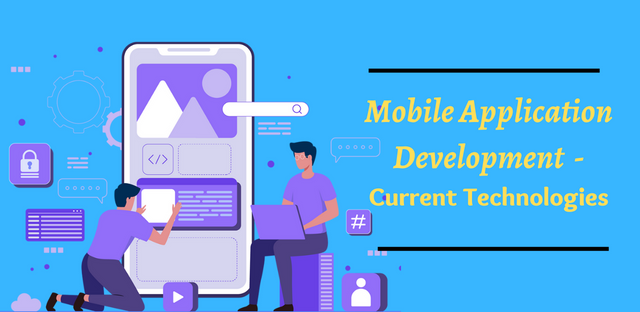Mobile Application Development - Current Technologies

Posted on 2023-02-17 12:48:41, by Seawind
Mobile application development
has come a long way since the early days of smartphones. Today, there are a
wide variety of tools, technologies, and frameworks that developers can use to
build mobile apps for iOS and Android devices. Here are some of the current
technologies that are commonly used in mobile application development.
Native App Development:
Native app development is the traditional way of
building mobile applications, where developers create applications
specifically for a particular operating system, such as iOS or Android.
Developers use programming languages such as Java or Kotlin for Android and
Swift or Objective-C for iOS. Native app development provides the best
performance, user experience, and access to device hardware.
Hybrid App Development:
Hybrid app development is a
popular approach for building mobile applications that work on multiple
platforms. It uses web technologies such as HTML, CSS, and JavaScript to create
a single codebase that can be used on both iOS and Android devices. Popular
frameworks for hybrid app development include React Native, Ionic, and Xamarin.
Cross-Platform Development:
Cross-platform development is a
way of building mobile applications that can work across different operating
systems. Developers use frameworks such as Flutter and Kotlin Multiplatform to
create a single codebase that can be used on both iOS and Android devices.
Cross-platform development is a popular choice for companies that want to build
mobile applications quickly and efficiently.
Cloud Services:
Cloud services play a critical
role in mobile application development, providing developers with access to a
range of services such as storage, authentication, messaging, and analytics.
Popular cloud service providers for mobile application development include
Amazon Web Services (AWS), Google Cloud Platform (GCP), and Microsoft Azure.
Artificial Intelligence and Machine Learning:
Artificial intelligence (AI) and
machine learning (ML) are increasingly being used in mobile application
development. Developers use AI and ML technologies to create intelligent
applications that can learn from user behavior and provide personalized
experiences. Popular AI and ML frameworks for mobile application development
include TensorFlow, PyTorch, and Keras.
Internet of Things (IoT):
The Internet of Things (IoT) is a
network of connected devices, and mobile applications are often used to control
and monitor these devices. Developers use IoT platforms such as AWS IoT and
Microsoft Azure IoT to build mobile applications that can communicate with
connected devices and sensors.
Blockchain Technology:
Blockchain technology has been
gaining traction in mobile application development, especially in the areas of
fintech and e-commerce. Developers use blockchain platforms such as Ethereum
and Hyperledger Fabric to build decentralized applications (dApps) that enable
secure and transparent transactions.
Augmented Reality and Virtual Reality:
Augmented reality (AR) and
virtual reality (VR) are technologies that enable mobile applications to create
immersive experiences for users. Developers use AR and VR frameworks such as
ARKit, ARCore, and Unity to create mobile applications that incorporate 3D
models, animations, and spatial audio.
Progressive Web Apps:
Progressive web apps (PWAs) are a
relatively new technology that enables mobile applications to be delivered
through web browsers. PWAs provide a native app-like experience and can be
accessed through a user's web browser without the need for a separate app
installation. Popular PWA frameworks include Ionic, React, and Angular.
Microservices Architecture:
Microservices architecture is an
approach to mobile application development that involves breaking down an
application into smaller, independent services that can be developed and
deployed separately. This approach enables developers to build more flexible,
scalable, and resilient mobile applications.
DevOps:
DevOps is a set of practices that
enable developers to collaborate more effectively with operations teams and
deliver applications faster and more reliably. DevOps tools and practices
include continuous integration and delivery (CI/CD), containerization, and
automation tools.
Low-Code Development:
Low-code development is a visual
approach to mobile application development that enables developers to create
applications without writing code. Low-code platforms such as Mendix,
OutSystems, and Appian provide drag-and-drop interfaces and pre-built
components that enable developers to build mobile applications more quickly and
with less coding.
In conclusion, the field of mobile
application development is constantly evolving, with new technologies and
tools emerging all the time. To be successful in mobile application
development, it is essential to keep up with the latest trends and to choose
the right technology stack for your project. Whether you choose to develop
native apps, hybrid apps, or cross-platform apps, it is important to choose the
right technology stack and to leverage the latest technologies to create
compelling and engaging mobile applications.

